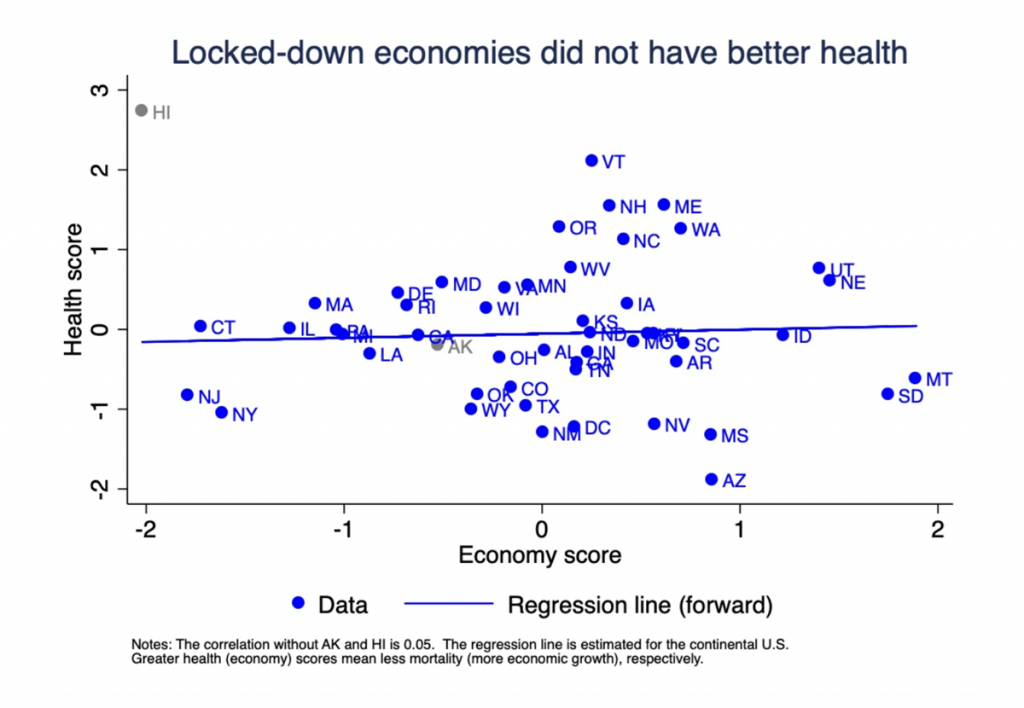Gore Vidal once said “I told you so” are the four most beautiful words in the English language.
Perhaps this is why it’s difficult to resist sharing new data that show how Sweden’s much-maligned pandemic response was right after all.
For those who’ve forgotten, Sweden was excoriated by corporate media and US politicians for its lighter-touch Covid-19 strategy. Many were downright hostile to the Swedes for refusing to shutter schools, lock down businesses, and ramp up police to enforce mandates.
Here’s a sample of headlines:
• “Why the Swedish Model for Fighting COVID-19 Is a Disaster” (Time, October 2020).
• “The Inside Story of How Sweden Botched Its Coronavirus Response” (Foreign Policy, December 2020).
• “Sweden Stayed Open and More People Died of Covid-19, but the Real Reason May Be Something Darker” (Forbes, 2020).
• “Sweden Has Become the World’s Cautionary Tale” (New York Times, July 2020).
• “I Just Came Home to Sweden. I’m Horrified by the Coronavirus Response Here” (Slate, April 2020).
This is just a taste of the reactions against Sweden in 2020. By opting to allow its 10 million citizens to continue living relatively normal lives, Sweden was, in the words of The Guardian, leading not just Swedes but the entire world “to catastrophe.”
Even then-president Trump got in on the action of smacking Sweden around.
“Sweden is paying heavily for its decision not to lockdown,” the tweeter-in-chief warned.
Despite the foreboding rhetoric, the worst-case predictions for Sweden never materialized. In fact, they were not even close.
In March 2021, it was apparent that Sweden had a lower mortality rate than most European nations. The following year, Sweden boasted one of the lowest mortality rates in Europe.
By March 2023, Sweden had the lowest excess death rate in all of Europe, according to some data sets. And though some weren’t ready to admit that Sweden had the lowest excess mortality in all of Europe, even the New York Times, which had mocked Sweden’s pandemic strategy, conceded that the nation’s laissez-faire approach was hardly the disaster many had predicted.
More recently, Danish economist Bjørn Lomborg shared a statistical analysis based on government data from all European countries from January 2020 to August 2022. The study demonstrated that Sweden had the lowest cumulative age-standardized mortality rate in all of Europe in that period.
“Across Europe, Sweden saw [the] lowest total death during and after Covid,” Lomborg said on X (formerly Twitter).
One Economic Fallacy to Rule Them All
Lomborg’s analysis provides yet more evidence that the Covid state was a disaster.
Some will say, How could we have known?
The harsh truth is that some of us did know. In March 2020, I warned that government “cures” for Covid-19 were likely to be worse than the disease itself. The following month, I argued that Sweden’s laissez-faire policy was likely to be a more effective policy than the hardline approach favored by other nations.
I wrote these things not because I’m a prophet, but because I’ve read a bit of history and understand basic economics.
History shows that collective responses during panics tend not to end well, and economist Antony Davies and political scientist James Harrigan explained why near the beginning of the pandemic.
“In times of crisis, people want someone to do something, and don’t want to hear about tradeoffs,” the authors noted. “This is the breeding ground for grand policies driven by the mantra, ‘if it saves just one life.’”
The thing is, tradeoffs are real. Indeed, economics is largely a study of them. When you choose one thing, you give up another; and we evaluate outcomes based on what we get versus what we gave up. We call this opportunity cost.
Throughout most of the pandemic, however, there were those who didn’t want to pay any attention to opportunity costs or the unintended consequences of government lockdowns—and they were legion.
This is the great economic fallacy Henry Hazlitt warned of decades ago.
Hazlitt, the author of Economics in One Lesson, claimed that overlooking the secondary consequences of policies accounted for “nine-tenths” of the economic fallacies in the world.
“[There is] a persistent tendency of men to see only the immediate effects of a given policy,” he wrote, “and to neglect to inquire what the long-run effects of that policy will be.”
This was the fatal flaw—quite literally—of the Covid state. Its engineers didn’t realize they were not saving lives, but trading lives (to borrow a turn of phrase from Harrigan and Davies).
Lockdowns weren’t scientific and proved ineffective at slowing the spread of Covid, but even if they had worked, they came with severe collateral damage: cancer screenings plummeted, drug use surged, learning was lost, and global poverty exploded. Depression and unemployment skyrocketed, businesses went bankrupt, and high inflation arrived. Babies were denied heart surgery because of travel restrictions, youth suicides increased…the list goes on and on.
The dark truth is that lockdowns were not based on science and came with a rather unfortunate side effect: they killed people.
‘A Giant Experiment’
The secondary consequences of lockdowns and other non-pharmacological interventions (NPIs) did irreparable harm to humans that will be experienced for decades to come.
In the words of New York magazine, lockdowns were “a giant experiment” that failed.
Sweden’s top infectious disease expert, Anders Tegnell, was one of the few people to understand that lockdowns would probably not work. And though Tegnell is not a professional economist, he seemed to understand the lesson of secondary consequences better than many economists.
“The effects of different strategies, lockdowns, and other measures, are much more complex than we understand today,” he told Reuters in 2020, when his strategy was under fire.
By understanding this basic economic principle and having the courage to stand by his convictions, Tegnell was able to avoid the pernicious effects of lockdowns, a policy that seduced so many central planners.
Today, many more people in Sweden are alive because of it. And Anders Tegnell should not be shy in saying, “I told you so.”
This article was originally published on FEE.org. Read the original article.


